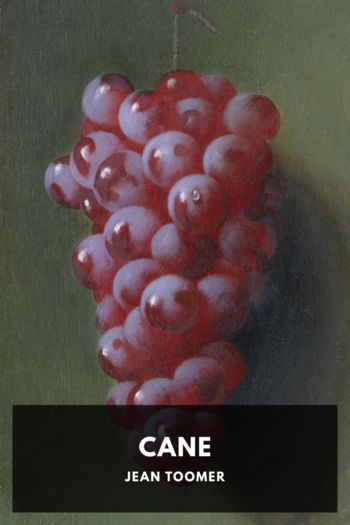Cane Jean Toomer (story books to read TXT) 📖

- Author: Jean Toomer
Book online «Cane Jean Toomer (story books to read TXT) 📖». Author Jean Toomer
Using the noise of the town clock striking twelve to cover the creaks of her departure, Esther slips into the quiet road. The town, her parents, most everyone is sound asleep. This fact is a stable thing that comforts her. After sundown a chill wind came up from the west. It is still blowing, but to her it is a steady, settled thing like the cold. She wants her mind to be like that. Solid, contained, and blank as a sheet of darkened ice. She will not permit herself to notice the peculiar phosphorescent glitter of the sweet-gum leaves. Their movement would excite her. Exciting too, the recession of the dull familiar homes she knows so well. She doesnt know them at all. She closes her eyes, and holds them tightly. Wont do. Her being aware that they are closed recalls her purpose. She does not want to think of it. She opens them. She turns now into the deserted business street. The corrugated iron canopies and mule- and horse-gnawed hitching posts bring her a strange composure. Ghosts of the commonplaces of her daily life take stride with her and become her companions. And the echoes of her heels upon the flagging are rhythmically monotonous and soothing. Crossing the street at the corner of McGregor’s notion shop, she thinks that the windows are a dull flame. Only a fancy. She walks faster. Then runs. A turn into a side street brings her abruptly to Nat Bowle’s place. The house is squat and dark. It is always dark. Barlo is within. Quietly she opens the outside door and steps in. She passes through a small room. Pauses before a flight of stairs down which people’s voices, muffled, come. The air is heavy with fresh tobacco smoke. It makes her sick. She wants to turn back. She goes up the steps. As if she were mounting to some great height, her head spins. She is violently dizzy. Blackness rushes to her eyes. And then she finds that she is in a large room. Barlo is before her.
“Well, I’m sholy damned—skuse me, but what, what brought you here, lil milk-white gal?”
“You.” Her voice sounds like a frightened child’s that calls homeward from some point miles away.
“Me?”
“Yes, you Barlo.”
“This aint th place fer y. This aint th place fer y.”
“I know. I know. But I’ve come for you.”
“For me for what?”
She manages to look deep and straight into his eyes. He is slow at understanding. Guffaws and giggles break out from all around the room. A coarse woman’s voice remarks, “So thats how th dictie niggers does it.” Laughs. “Mus give em credit fo their gall.”
Esther doesnt hear. Barlo does. His faculties are jogged. She sees a smile, ugly and repulsive to her, working upward through thick licker fumes. Barlo seems hideous. The thought comes suddenly, that conception with a drunken man must be a mighty sin. She draws away, frozen. Like a somnambulist she wheels around and walks stiffly to the stairs. Down them. Jeers and hoots pelter bluntly upon her back. She steps out. There is no air, no street, and the town has completely disappeared.
ConversionAfrican Guardian of Souls,
Drunk with rum,
Feasting on a strange cassava,
Yielding to new words and a weak palabra
Of a white-faced sardonic god—
Grins, cries
Amen,
Shouts hosanna.
Hair—braided chestnut,
coiled like a lyncher’s rope,
Eyes—fagots,
Lips—old scars, or the first red blisters,
Breath—the last sweet scent of cane,
And her slim body, white as the ash
of black flesh after flame.
Up from the skeleton stone walls, up from the rotting floor boards and the solid hand-hewn beams of oak of the prewar cotton factory, dusk came. Up from the dusk the full moon came. Glowing like a fired pine-knot, it illumined the great door and soft showered the Negro shanties aligned along the single street of factory town. The full moon in the great door was an omen. Negro women improvised songs against its spell.
Louisa sang as she came over the crest of the hill from the white folks’ kitchen. Her skin was the color of oak leaves on young trees in fall. Her breasts, firm and up-pointed like ripe acorns. And her singing had the low murmur of winds in fig trees. Bob Stone, younger son of the people she worked for, loved her. By the way the





Comments (0)